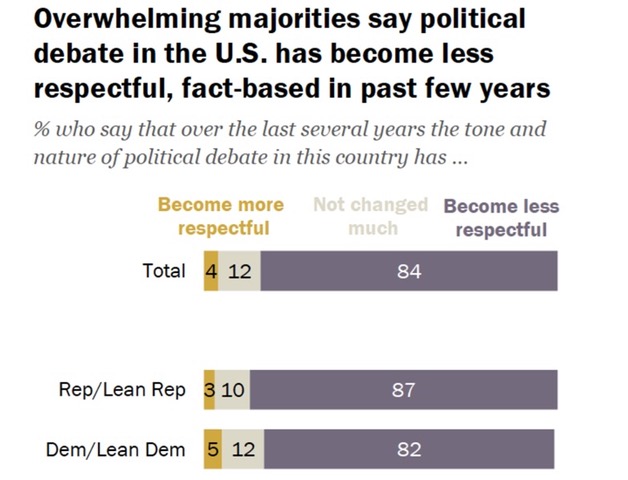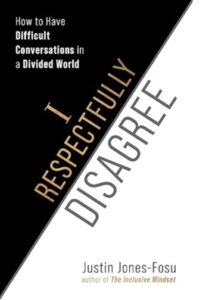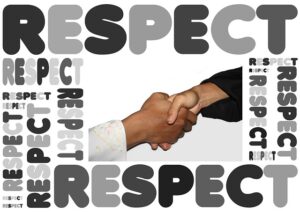When it comes to politics these days you can be sure there are LOTS of divisive conversations going on.

It’s not expected that we’ll all agree on the important topics, but come on everybody – can’t we at least learn how to respectfully disagree?
Before you argue with, block, curse out or cut off individuals due to their political views, learn how to respectfully disagree and build bridges instead of barriers. We need to challenge our own perspective because we all think that we’re right, I guess, until we realize maybe we’re not 100%, right.

That’s the message Justin Jones-Fosu is shouting from the rooftops in his upcoming book:
“I Respectfully Disagree: How to Have Difficult Conversations in a Divided World”.

Justin is international speaker and the founder of Work. Meaningful. He shares some great advice on how to handle extreme political conversations. We had a much-needed conversation about this topic live on my radio show and
Justin pointed out, “It’s been bad for a long time, but it’s with the rise of media and everybody having a voice and platform that It’s gotten really bad. Even in workplaces, three out of four people say that their management can handle, should handle conflict better.”
“But just think about anecdotally, as we see online, as people talk to each other, there’s these two things that are happening.”
“One of, we see a respectful disagreement, disrespectful disagreement. But there’s also an interesting phenomenon we found in our studies, is this other thing called ‘disrespectful agreement’.
“And I see it in a lot of the audiences and corporations I go in, is that people are in front of your face, they’re like, oh Debbie, I think that music was amazing. And then behind the scenes, they’re talking to the producer, like, why would you even play that? And that’s one of the things that’s also causing disrespectful discriminates as well, is because people are passively, or what the new generation is calling gaslighting others.”
I couldn’t agree more with Justin that people need to try harder to build bridges to people rather than barriers from them.

He shares some good suggestions about how we all can start to go about doing that better.
“I think the foundation for us lies in the statement I’ve been making for about the last decade is that we can vehemently disagree with someone’s ideology and yet still passionately pursue their humanity. That’s the starting point. Because oftentimes we consistently attach ideology with identity. And so I’ll start with challenging perspective because I think that speaks to what we do. I mean, it starts before any disagreement happens. It’s the posture, the position that we put ourselves in.”
Justin Shared a Practical Example Of How To Open Your Perspective
“One of the things I started to challenge myself to do is this thing called Circles of Grace, where it’s the thing that my mom taught me. My mom took us to events that we didn’t know a lot about and that we also disagreed with. And so when you constantly are putting yourself in positions of learning and hearing other people’s perspectives, so every six months I go to events, experiences, or I engage with people that I either don’t know a lot about or that I disagree with. And that’s helped me to consistently challenge my perspective and learn.”
I‘m glad I took the time to chat with Justin. Besides being an author Justin Jones- Fosu is also a full-time dad-e, and social entrepreneur. He speaks 50-60 times a year for professionals, corporations, organizations, and associations. His clients include some of the biggest names in The Fortune 500 to the best spelled names in Fourth Grades across the country he says. LOL
I also really like that he’s fun. Like me, he often uses humor to get a serious message across.
I think it would be meaningful for you to take a few minutes to listen to this podcast of our live conversation from The Debbie Nigro Show. Might save some of your relationships!
If You’d rather read than listen, the transcript of the audio is below.
AUDIO TRANSCRIPT:
0:00:42
Hi, everybody.
1
0:00:42
I’m Debbie Nigro. I wasn’t having a good time this morning. I was saying bad words out loud just now because I was trying to get my post up for my guests on Instagram, Facebook. Nothing’s happening. I couldn’t reset my password. I can’t get in. I’m locked out. I just get an incredible message, news alert that there’s a massive outage and everybody’s locked out of their Facebook and Instagram accounts. So that’s the story there.
Hey, I just want to introduce you to my first guest right at the top of the hour here because you know, speaking of bad words and talking, saying things you shouldn’t say, that’s what’s happening around the world these days when it comes to people talking politics and disagreeing.
And since it’s Super Tuesday, it was very apropos that I invited Justin Jones, foes who to join me today. He’s got a book out. I just was in love with the title. It’s called, actually it’s coming up in April, it’s coming out, I Respectfully Disagree, How to Have Difficult Conversations in a Divided World. And you know, as all those millions of Americans in those states around the country cast their votes today, there’s going to be a lot of divisive conversation going on. So before you argue with somebody or say something not nice or cut somebody off due to their political views, why don’t we learn together how to respectfully disagree?
Okay, Justin, you couldn’t have arrived at a better time. Welcome.
Thank you so much.
I’m so excited. What I’d loved about reading about you is that you’re also fun, like me, and like me, you often use humor to get a serious message across. Now, let me just give everybody a little bit more of your background, if you don’t mind, because you’re very impressive. And I’m so happy to have you, Justin. Justin Jones, and there’s a third name, Fosu. You like the Justin Jones Fosu instead?
2
0:02:43
That’s perfect. Justin Jones Fosu is actually the full name.
1
0:02:47
Okay, cool. I’m like Deborah Nygren of Tully, because I was married, but then I kept the name to attach to my daughter but then he got remarried, you know. Anyway, Justin Jones, full-time daddy, social entrepreneur, MBA, CSP, international speaker and the founder of Work Meaningful. He has and does like 50 or 60 times a year go out and talk to really big corporations and organizations and some of the biggest names in the Fortune 500 world. And I love that you said, and also, to some of the best spelled names in fourth grades across the country. Got me there, got me there. I love you. Anyway, this is a massive topic
4
0:03:26
that people can’t talk civilly to each other
1
0:03:28
when they don’t agree. And it started some years ago, obviously. And I get it, you know, people have passion, but I get sick to my stomach when I Try and have a rational conversation with somebody who I don’t agree with but I’m always respectful and they’re not I’m like really So how bad is this problem? Yeah, it’s really bad
2
0:03:51
It’s been bad for a long time, but it’s with the rise of media and everybody having a voice and platform It’s got really really bad interest even in workplaces, three out of four people say that their management can handle, should handle conflict better.
But just think about anecdotally, as we see online, as people talk to each other, there’s these two places that are happening.
One of, we see a respectful disagreement, disrespectful disagreement. But Debbie, there’s also an interesting phenomenon we found in our studies, is this other thing called ‘disrespectful agreement’.
And I see it in a lot of the audiences and corporations I go in, is that people are in front of your face, they’re like, oh Debbie, I think that music was amazing. And then behind the scenes, they’re talking to the producer, like, why would you play that? Like, I don’t even know.
And that’s one of the things that’s also causing disrespectful discriminates as well, is because people are passively, or what the new generation is calling gaslighting others.
1
0:04:52
Wow. So, it’s obviously going to be tis the season for more of this unless we figure out how to do it better. And I kind of liked what you had to say about the discourse between people.
You know, let’s try and bring people closer together rather than putting up barriers. So you had some tips and I thought this was a good day on Super Tuesday to share some of the tips from your book, which I think is great, man. So where do you want to start?
About challenging your own perspective because we all think that we’re right, I guess, until we realize maybe we’re not 100%, right?
6
0:05:28
Right.
2
0:05:29
I think the foundation for us lies in the statement I’ve been making for about the last decade is that we can vehemently disagree with someone’s ideology and yet still passionately pursue their humanity. That’s the starting point. Because oftentimes we consistently attach ideology with identity. So how do we do that is what we’ve done in the five pillars, right?
And so I’ll start with challenging perspective because I think that, you know, speaks to what we do. I mean, it starts before any disagreement happens. It’s the posture, the position that we put ourselves in. And so I’ll give you a great practical example.
One of the things I started to challenge myself to do is this thing called Circles of Grace, where it’s the thing that my mom taught me. My mom took us to events that we didn’t know a lot about and that we also disagreed with. And so when you constantly are putting yourself in positions of learning and hearing other people’s perspectives, so every six months I go to events, experiences, or I engage with people that I either don’t know a lot about or that I disagree with. And that’s helped me to consistently challenge my perspective and learn.
1
0:06:30
That’s a great idea. Really nice suggestion there. Circles of Grace challenge. That’s from your mom, you said?
2
0:06:38
Yeah, so my mom didn’t call it that, but I realized when we were growing up, my mom would take us to do the things. I was like, why are we here? We don’t even agree with that. And what my mom was trying to do is, and she shared this story. See, my mom was one of the first black female air traffic controllers in the Air Force. And she said that there were some times when she was stationed in Japan that there were some soldiers who never left base in two years and had the ability to. And she was like, Justin, I don’t want you and your brother to be like that. It’s a single mom who had these two rambunctious boys. She was like, Justin, I want you all to leave your home base to experience the beauty of people and cultures around you. So my mom was planting those seeds of how do we challenge our perspective early on, even if we don’t agree.
1
0:07:17
Wow, she was a wise woman and a really dynamic pioneer. Good for her. You come from good DNA.
2
0:07:24
I got it from my mama.
1
0:07:27
Yeah, it’s always the mamas that pass on, hopefully, the good stuff. There’s always a few bad things that come too. But the book, which the title is Right on the Money, you know how to respectfully disagree with other people here when this world we live in Where did the inspiration come to put it all together in one place? Yeah
2
0:07:50
Been working on the concept and wrote the book the inclusive mindset and that came out and I’ve been doing workshops you know for over close to two decades now. And I would make that statement about we can be and we disagree and you know and still embrace human humanity and people would go oh oh my god and but then people come up afterwards like Justin I love that statement but how do we do it? How can I live that out?
And so for me I started giving practical examples and ways to live it out but then I was like I need to dive into this and partly with a couple things. One, I’m a proud pop of two high-energy kids, right? I feel like I’m like my mom or reverse it.
And like I don’t want a new generation defined by their divisiveness but rather by the deliberate depth of the relationship. So that’s number one.
And number two, I started noticing as I challenged myself to listen to others more deeply, to ask more questions, just filling in the gaps with curiosity and not conclusions, I started to connect better with people that were on completely opposing views and I wanted to help other people be bridges rather than barriers.
1
0:09:00
You said the word divisiveness, I said divisiveness. Which one is it? Yes.
2
0:09:05
I get into that, it’s so funny.
1
0:09:09
I knew I liked you, I knew I liked you. Okay, so you have five pillars of bridging the divide and how and when to employ them. One was to challenge your perspective, right? And the second is to be the student. The third is cultivate your curiosity. The fourth is seek the gray. And the five is agree to respect. Do you have more time to stay on to the next segment or do you have to go? You can stay?
5
0:09:38
One more time. Yes.
1
0:09:39
All right. I need you.
2
0:09:40
As long as you dance with me.
1
0:09:41
I think I hear. Great. You got it. By embracing and implying these pillars, Justin says, you kind of figure it out. You can bridge divides, foster a culture of mutual respect and contribute to a more understanding and empathetic world. And I’m all for that. If you’re just tuning in, this is the Debbie Nygro Show. You’re listening to Justin Jones Fosu, who wrote How to Have Difficult Conversations in a Divided World. The book is called I Respectfully Disagree. Gosh knows we need this information now, and especially on days like today, where everybody’s out, you know, sharing their opinion loudly. And I do encourage everybody to vote, because your opinion and your votes matter. Come on back. More to come. And now, back to the Debbie Nigro Show.
3
0:10:27
Alright, let’s gonna, what kind of crazy opening is that?
4
0:10:34
Hey everybody, we’re going to try to learn to respectfully disagree with one another. This is the season where we really could use some help in this department. I’ve seen so many people’s relationships go down the tube because they have different views politically and it just, you know, that’s it.
1
0:10:52
And there’s no way of patching it up. I’m always a middle girl. I try and stay open to both sides of conversation. My guest today is right on time. Justin Jones Fosu wrote a book that I thought was well worth mentioning, I Respectfully Disagree, How to Have Difficult Conversations in a Divided World. Welcome back, Justin. It’s nice to have you today.
5
0:11:33
Thank you.
1
0:11:34
Yeah, me and you could hang out.
2
0:11:36
I’d love that
1
0:11:38
We talked okay, we got five like suggestions on how to do this You know how to bridge this ridiculous divide and when to employ these things we talked about changing your perspective Perspective you’re challenging your perspective, and you said you know put yourself And other people’s experiences and your mother suggested once Like the circle of grace challenge every six months you intentionally You intentionally go where people experience events that have never been in your life before and things you don’t know a lot about or disagree with and see what’s going on. The second one was be the student, which basically is to somehow put aside your own bias to try and understand somebody else and learning more than lecturing. That’s an important one. I thought that was important. But also cultivate your curiosity. So they’re kind of tied together. Whereas when you hit a dead end, right, you and you hear this thing, you’re not making any progress. Maybe you should, you know, ask questions and try and better understand. Is that what you’re trying to say?
2
0:12:40
100%. I think our brains are actually working against us in this, Debbie. The research shows over and over again that we have second and third hand information. What we often do is categorize your future use. And so it’s like that time when you’re driving Monday through Friday, if you drive and then Saturday you’re supposed to go straight, but what do you do? You take the exit because you’re used to taking the exit. And that’s what our brains do with people, especially in those disagreements. And so one of the things we encourage people to do is to fill in the gaps with curiosity and not conclusions. And here are two quick practical ways to do that. Number one is something we created called the power of three is where you listen at least to the third level of the conversation, right? And so they may say something, you may ask, respond to the question. They may say something, respond to the question, right? And it’s really curious questions. And if you struggle with, I don’t know what to say, one of the key phrases that we love using is tell me more. Because it allows people to actually get to the crux to the root of substance of what they’re saying so that we can truly better understand it. Because oftentimes, Debbie, I realize we’re arguing about different things. Yeah, we use different words or terminology and they’re like, wait a minute, that’s not even a term. That’s not how I’m defining it. So being curious, cultivating our curiosity is really about asking more questions. And not necessarily, I wouldn’t say put aside the bias, I’d say lean into that bias. Right? And say, Hey, I know I have this, let me ask more questions.
1
0:14:04
Right. And you also mentioned Seeking the Gray, which is finding common ground.
2
0:14:10
Yes, 50 pages.
1
0:14:11
I just wrote a book. I wrote a book, too. Mine is called How to Talk to Strangers, Advice from a Professional Stranger Talker. I love that.
2
0:14:20
Right?
1
0:14:21
Me, too. Maybe you’ll teach me how to be a good speaker. I was reading that you’re one of the top speakers in the country. You got the highest award, like the designation, certified speaking professional, highest earned designation given by the National Speakers Association to only 15% of NSA speakers worldwide. You are something.
5
0:14:41
You’ve got a situation.
2
0:14:42
I’m having fun. I’m grateful that people allow me to be goofy on stage. So I bring this really weird thing of research, but in a very practical relatable way and that’s what I’m about. So even if you talk about your book which I love and I need to highlight is We Seek the Gray, all 50 Shades of It, one of the things that matters is that oftentimes we think of things in very black and white and it’s really gray and I uncovered this for me in forgiveness of my dad for not being in my life growing up. And I was going to go confront him in 2019. He’s originally from Ghana and I was going to go pull the whole Will Smith thing, not the slap with Chris Rock, but the whole Fresh Prince of Bel-Air one. I just asked him why he wasn’t there. Instead, my therapist, which I love, and my leadership Charlotte cohort challenged me to go and hear his story. If I heard his story and asked questions, I saw the gray and I better understood how my dad got there. So it allows me to lean in and better understand. I still disagree with the outcome, but it allowed me to create the gray to have more empathy in how he got there. That’s a heavy story. Thank you for sharing that. Yeah, thank you. Yeah, very much. I didn’t cry this time, but oftentimes when I share this story, I get emotional because I remember the feelings that I felt. And I remember putting myself in that position and feeling like I missed something. And so that allowed me to then lead to that last pillar, which is the degree to respect. And that’s one of the things that’s very paramount for us. We actually created what we call the 10 characteristics of golden respect, because we started noticing that people define respect very differently. And one of the things that we said is like, one of the misconceptions of social views of respect is that you got to earn my respect. And we started asking, but why? Why do I have to earn your respect? Or why should someone earn your respect? Why can’t you choose to freely give it? It’s almost like forgiveness is distant cousin, right? Because we finally got to the point where with forgiveness, we realized it’s not about us, not about that person, it’s about us. And it’s the same thing with respect. Whether that person chooses to respect them.
1
0:16:54
Well, you know, you’ve got a lot to say about this and there’s a lot that needs to be said about that need for respectful disagreement. When emotions get involved, and you’re just, you know, an example of one emotion where it brings tears to your eyes when you talk about it. When emotions get involved in conversations about people’s opinions on topics that are very serious and you’ve mentioned a lot of them, climate change, inflation, economy, jobs, gun control, women’s reproductive rights, war and more. The emotions sometimes can’t be held back because they’re real and people are angry and some are livid and some are just, when emotion fills you, we all know, sometimes you can’t be reasonable. I mean, look at, like, you ever been in a relationship where somebody broke up with you and you’re like flipping out, you know, you just disengage or how do you politely disengage? What’s the move?
2
0:18:07
Well, two things. One is that if that person is being very – and emotions are okay, right? Passion is okay. Somehow we’ve created respect to be – have to be very civil and have to talk in a very quiet tone. There is never a moment – my kids will tell you that I talk in a disrespectful manner, not in a blaming manner, not in a name-calling manner. Those are the things that move to the place of disrespect. Now what can I do if someone is doing that to me? There are times I have to be very intentional to not blame them, right? Because I’m going to tell you what will absolutely set somebody off the edge is if they’re being disrespectful to me and I say, I see that you’re very angry about this. That’s the exact wrong thing to say because now you just blame them and they feel even more entitled to their passion of anger at that moment. So one of the things that I often challenge myself to do and Debbie I’m not perfect, I’m still growing in this is I say, hey I noticed that we may not be getting anywhere in the conversation. If you’d like to, I’d like to revisit it a little bit later. I’ve now made it a mutual thing rather than a them thing. And that’s one of the big mistakes I used to often make. And the other thing is when we are the one who are engaged and we notice ourselves just feeling and we seeing red and it’s just like, oh my gosh, I can’t even think. It may be a good time for us to disengage and for us to say, hey, you know what, I just need a moment to think through this. And I’m going to give you the last one, Debbie. It’s the times where we’ve crossed the line. And I’ve done this over and over again. I actually, when writing the book, I was on my writing retreat, I actually disrespectfully disagreed with another person on my writing retreat. And I realized I did. That’s very disrespectful.
1
0:19:57
You disrespectfully disagreed while you were writing I Respectfully Disagree, is that correct?
2
0:20:04
Yes.
1
0:20:05
Oh good, that’s common clean.
2
0:20:08
I had to come back and apologize to him and said hey, I’m so sorry, I apologize and I asked to hear more and I went back to the pillars. So it’s not about being perfect, it’s about choosing to make progress as you grow.
1
0:20:20
That’s funny. I just think that one of the most important things you are getting at here is that people have to open up their sources of information and curiosity because if you only hear the same thing over and over which is what happens a lot in this country where people will just only watch a certain channel and only listen to a certain person they become narrow in what the bigger picture is and people love to throw facts but they often are from one side or another and there’s some good facts out there and there are facts about everything, right? And facts, you know, and there’s lies about everything but I just think the key to civility is as always education, right? The more you know, the more you can communicate, you know, better with other people and the more you use your brain to try different things the more chances you have of getting along with all kinds of people and It’s just a nice topic to bring up today on a as we enter a difficult phase in our country not that we haven’t had past difficult one who just got more of them coming and You know you put up a great Slide that said overwhelming majority say political debate in the u.s. Has become less respectful fact-based in the past few years, you say it, and you have a whole percentage of who say over the last several years the tone and nature of political debate in this country has become more respectful, become less respectful. Pretty much everybody who’s got an opinion and a brain, right? So thank you for taking the time. I’m going to say the name of the book again in case anybody is just tuning in. Hi guys, I’m Debbie Nigro and I’m having the pleasure this morning of talking to a great spirit. I feel your spirit, Justin. Thank you, Debbie. Justin Jones-Bosu, who wrote, I respectfully disagree, how to have difficult conversations in a divided world. Tell me, where are you speaking about this next? What’s coming up for you?
2
0:22:30
Yes, I’m actually here in Miami on spring break with my kids now and I’m getting ready to speak for a floral distribution conference. What kind of conference? I’ll be bringing up floral distribution, so people who supply flowers. It’s actually pretty awesome for the topic I’m talking about. We should send flowers to all the people we agree with.
1
0:22:51
You know why? I have a fake little brother, Ricky, who’s down there in Miami with a big floral company. I’ll tell him about you. Yes, he’s the best. He grew up in my house.
2
0:23:03
I’ll be there with him.
1
0:23:05
He’s my late brother’s great friend, Ricky. Bayfront Floral Decorators, you call them. They’re the best in Miami. Everybody uses them. He’s going to love it. I gave him a plug. It really is that good.
2
0:23:14
Yes, go Ricky, go Ricky.
6
0:23:15
Go Ricky, go Ricky.
2
0:23:16
The last thing I want to say is that a lot of people get confused on this part and that’s why I want to be very clear is that there are certain things I’m close-minded on. I hate when people say, you’ve got to be open-minded. Yes, there are things we have to be open-minded on, Debbie, but there’s a lot of things I’m close-minded on and you’re close-minded on, but we should never be close-hearted. So even when we’re close-minded, we should be open-hearted. And so that’s the heart of connecting with people, building more bridges rather than building a barrier
1
0:23:43
from them. Yeah. One last comment about you because I’m looking at your picture. That’s a kicking jacket you got on in your shop. Where’d you get a jacket
2
0:23:53
like that? It’s like Clyde. Yes. I get them custom made in Ghana. Interesting thing, yes, I get about five suits every time I go to Ghana, I get them custom made. And when I forgave my dad in 2019, an overwhelming sense of my heritage washed over me that I didn’t realize I was holding back. And in that place of respectful disagreement and forgiveness of my dad, I became proud to represent my dual heritage of both Ghana and the United States. So that’s where I get the maid. And whenever you’re ready to come to Ghana with me, let me know, Debbie. Oh my God, that’s some beautiful colors there of your heritage.
1
0:24:37
Love it on the limpel. So we had a nice time together, Justin, Jones, Fosu. I thank you so much for being my guest today. Thank you and best of luck to you and good luck. I’ll help you spread this message. I respectfully disagree. Book’s coming out in April. Justin Jones goes to how to have difficult conversations in a divided world. What’s your website?
2
0:24:58
Howtorespectfullydisagree.com and workmeaningful.com. Thank you so much.
1
0:25:03
Awesome. Terrific. Have a wonderful day.
5
0:25:06
Bye, Debbie. Dance, dance, dance.
1
0:25:10
Bye, Justin. I might just make him dress me. You’ve got to see his incredible lapel. It’s gorgeous. Bye, Justin. I might just make him dress me. You’ve got to see his incredible lapel. It’s gorgeous. Alright, more to come here on the Debbie Nigro Show next.
Transcribed with Cockatoo



